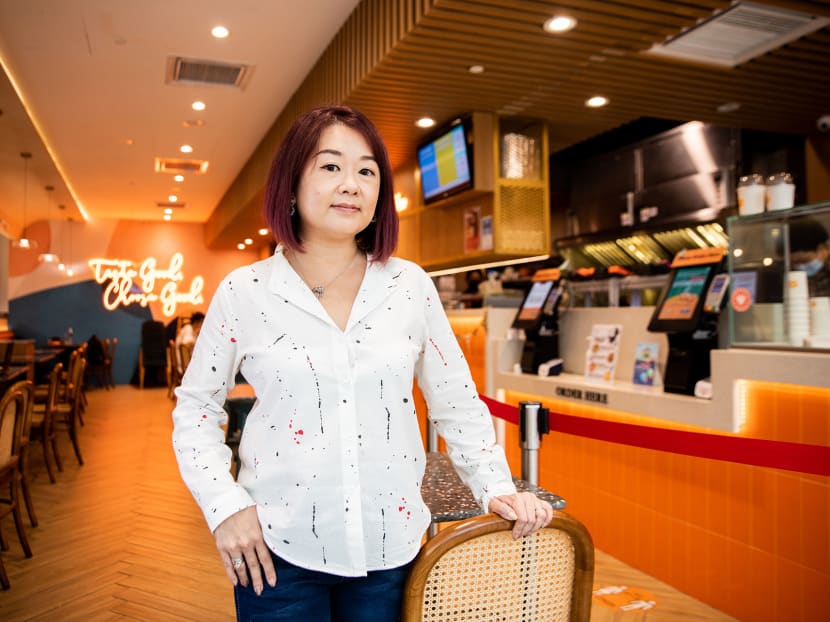SME Diaries: Our soup production lines couldn’t keep up with demand. Tech solved our woes
In this instalment of SME Diaries, Ms Angeline Lian, who leads the human capital department of food manufacturer Souperfoods, recounts the challenges its production lines had in coping with a sharp rise in demand for ready-to-eat soups with more people working from home during the pandemic.

Ms Angeline Lian, assistant director of human capital at The Soup Spoon, also leads food manufacturer Souperfoods' human capital department.
Small- and medium-sized enterprises (SMEs), which form 99 per cent of businesses in Singapore, have felt the impact of Covid-19 keenly. TODAY’s Voices section is publishing first-hand accounts from SME owners and managers on the highs and lows of running a business in the pandemic.
In this instalment, Ms Angeline Lian, who leads the human capital department of food manufacturer Souperfoods, recounts the challenges its production lines had in coping with a sharp rise in demand for ready-to-eat soups with more people working from home during the pandemic. The situation improved after it tapped technology to improve production performance.
Human capital is a valuable part of any business.
Since I joined Souperfoods in 2017, an entity born out of The Soup Spoon, I have been given the opportunity to review work processes by digitalising highly manual and repetitive roles.
The aim was to free up time for employees to take on higher-value tasks, such as supervisory roles, and to boost staff morale.
Then Covid-19 came.
It accelerated the need to make bold moves.
During the circuit breaker period last year to combat Covid-19 when dining out was banned, our company saw a 90 per cent jump in demand for our ready-to-eat soups as more people started working — and cooking — from home.
With orders from our online stores rising, we had to make plans for stocks of soup packets to meet our customers’ needs.
But our production lines could not keep up with the demand and we couldn’t identify the bottleneck.
We later joined an initiative by government agency Workforce Singapore and the Singapore Business Federation to tap technology to improve production performance.
An eight-week programme put the company through a trial called the Tulip.
A digital performance engine, it allowed the production manager to feed real-time data, such as the production schedule, into a dashboard disseminated to production operators via a tablet.
It also allowed the production manager to have a view of the production status without the need to be on the production floor.
Our staff members had to be skilled to operate the technology and interpret data.
The production operators had to learn how to use the app to enter production parameters, while the assistant production manager analysed and monitored trends from the data collected.
With consultants, we identified that the assistant production manager’s role could be redesigned to manage workflow better.
Previously, to plan the production cycle for the next day, the assistant production manager had to go through the laborious process of deciphering data such as the cycle time — the time taken for each production batch — and the wait between processes, by going through handwritten slips of paper.
Delays in production were not communicated promptly, resulting in unfulfilled orders.
With the technology, production data is collected automatically, eliminating the need for manual and repetitive work by production operators and managers.
It was not easy to change our production operators’ perspectives on technology. It took months of effort by various departments before they embraced it.
Ultimately, the programme made a difference to everyone’s jobs.
It simplified work processes, increased accuracy and reduced the loss of information transfer, especially when paper can be misplaced easily and handwriting is illegible at times.
With real-time monitoring of production and the time taken for each task, we can achieve better efficiency.
The potential for extra capacity in our chiller fridges also climbed by about 30 per cent.
We have plans to build our own app and potentially apply the technology to the rest of the manufacturing process to help us tap data for better productivity and management of our machines.
ABOUT THE WRITER:
Ms Angeline Lian, 39, joined restaurant chain The Soup Spoon in 2016 as its human resources and learning and development manager, and is now its assistant director of human capital. In 2017, the firm started a separate entity Souperfoods, which makes soups and ready-to-eat meals for The Soup Spoon. She was given the task of leading its human capital department and has seen its staff strength more than double from 25 to 52.
If you are an SME owner or manager with an experience to share or know someone who wishes to contribute to this series, write to voices [at] mediacorp.com.sg with your full name, address and phone number.






